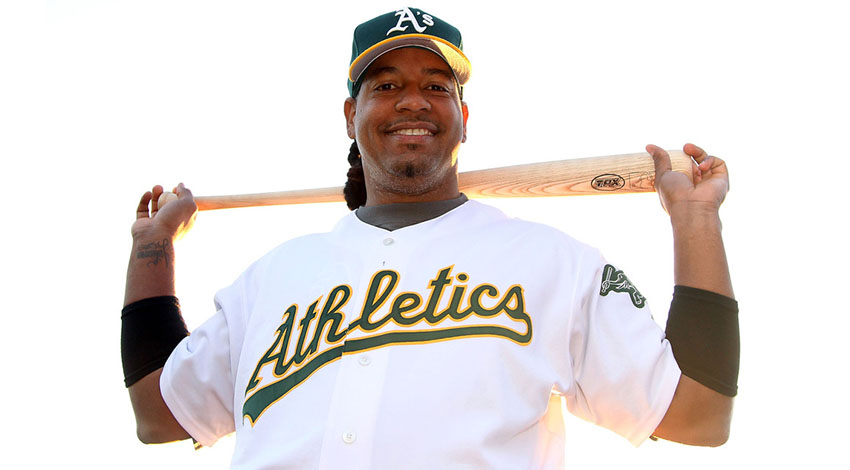Manuel Aristides Ramirez Onelcida, better known as Manny Ramirez, was born on May 30, 1972, in the sun-kissed fields of the Dominican Republic. The game of baseball captivated him from a young age, sparking dreams of someday joining the ranks of legendary players. As he transitioned into adolescence, his family moved to the United States, giving him the opportunity to pursue his aspirations in earnest. Unsurprisingly, he did more than just realize his dreams—he spectacularly exceeded them.
A versatile player capable of filling both outfielder and designated hitter roles, Manny Ramirez showcased his skills for multiple Major League Baseball (MLB) teams, including the Cleveland Indians, Boston Red Sox, Los Angeles Dodgers, Chicago White Sox, and Tampa Bay Rays. Today, his influence extends beyond the field as he serves as a free agent, consultant, and coach. With nine Silver Slugger Awards and a tally of over 500 home runs, Ramirez has cemented his status as one of the finest outfielders MLB has ever seen.
Endearing and enigmatic, Manny has earned a host of nicknames over the years, including “Man-Ram,” “Mannywood,” “Manny Being Manny,” and “Manny Angelico.” His on-field accomplishments are nothing short of stellar, including a record 21 grand slams—third in MLB history—and an unmatched 29 home runs in postseason games. Moreover, he’s been selected 12 times for MLB All-Star games.
The Financial Stakes of Stardom
The allure of celebrity status and the accompanying windfalls aren’t exclusive to the realms of music and film; sports icons like Manny Ramirez also command staggering sums. Baseball, especially, has seen its share of high-profile, high-earning players, as evidenced by rankings of the top-paid athletes. In 2014, Manny Ramirez held the third position in a list of baseball’s highest earners. Over his illustrious career, he raked in more than $200 million, peaking at nearly $24 million in a single season.
The second place was occupied by Derek Jeter, who gained fame mainly with the New York Yankees. During his tenure, the team secured four World Series championships. Jeter’s career earnings soared past $265 million, with his top seasonal earnings nearly matching Ramirez’s at $23 million.
The apex of baseball earners was Alex Rodriguez. Initially making his mark with the Seattle Mariners, Rodriguez has since retired but not before accumulating earnings of nearly $357 million, with a single-season high of $33 million.
The Metrics of Wealth: Beyond the Game
Forbes often analyzes the financial portfolios of sports celebrities, attributing significant income to advertising deals and endorsements. Manny Ramirez was no exception; he ranked among Forbes’ 20 richest athletes in 2005, pulling in a remarkable $24.2 million. During six of the eight years he spent with the Boston Red Sox, the club valued his contributions at a staggering $160 million.
Whether you admire him for his unparalleled skills or criticize him for the controversies that have dogged his career—including doping scandals—Manny Ramirez remains a multi-faceted figure in the annals of Major League Baseball. His story is a compelling blend of raw talent, financial prowess, and a penchant for both the awe-inspiring and the contentious.
The Unwritten Code and Manny’s Unique Approach
Every sport has its unwritten rules, those invisible guidelines that players are expected to follow. Baseball is no exception, and its exhaustive list of such unspoken norms often leaves little room for spontaneity, sometimes resulting in monotonous gameplay.
However, Manny Ramirez seemed to play by his own set of rules. His behavior often defied conventions, ranging from bizarre errors in the outfield to jaw-droppingly candid interviews. For example, a 500-foot homerun could be followed by a slow, almost theatrical trot around the bases. These quirks and idiosyncrasies became so commonplace that fans and commentators would usually dismiss them as simply “Manny being Manny.”
Another player known for his unique on-field personality was Roger Clemens. Nicknamed “Rocket,” Clemens was as known for his fiery temperament as he was for his explosive pitching. He never hesitated to let people know how great he thought he was, embodying a certain audacity rarely seen in the sport.
Manny Ramirez’s Troubles with Steroids and Doping
In the notorious “Steroid Era” of baseball, doping scandals were sadly not uncommon. Ramirez was among 104 MLB players identified as having used banned substances. In 2009, he faced a 50-game suspension for violating the league’s drug policy. Fast-forward to 2011, and Ramirez was again caught in a doping scandal, leading him to abruptly retire from the MLB to avoid a 100-game ban.
The substances involved in Manny’s violations were never officially confirmed but speculated to include Oxandrolone, Stanozolol, or Nandrolone.
Endeavors and Failed Comebacks
In 2014, reports surfaced that several MLB clubs were interested in signing Ramirez, who was also considering offers from Japanese baseball teams. Either way, he was prepared to give the game another shot. Unfortunately, his efforts to re-enter the big leagues never quite panned out.
The last time he took the field for an MLB game was in 2011. Although his original 100-game suspension was reduced to 50 upon his short-lived return, the closest he came to Major League action afterward was a stint at a farm team in Auckland. For a brief period, he even played baseball in Taiwan.
Now in his 40s, it’s clear that Manny Ramirez can’t quite let go of the sport that made him a household name, albeit a controversial one. In 2015, he took on an unofficial coaching role for young players, and in 2017, he played in Japan for the Kochi Fighting Dogs, a team in the independent Shikoku Island League Plus, which is not affiliated with Nippon Professional Baseball (NPB), Japan’s premier baseball league.
Whether admired or criticized, Manny’s impact on the sport remains indelible. His story is a fascinating tapestry of supreme talent, eccentric behavior, and a series of controversies that have left fans divided, but always intrigued.
